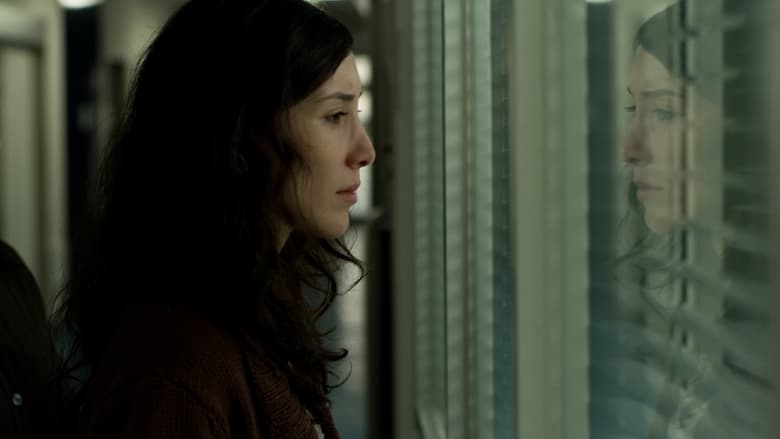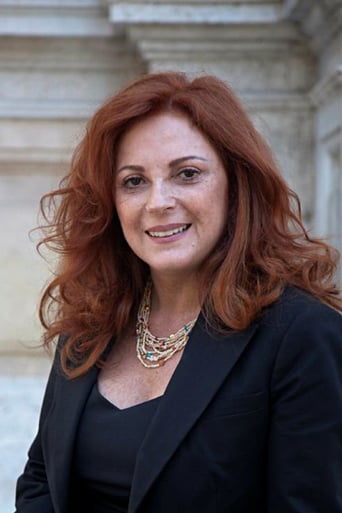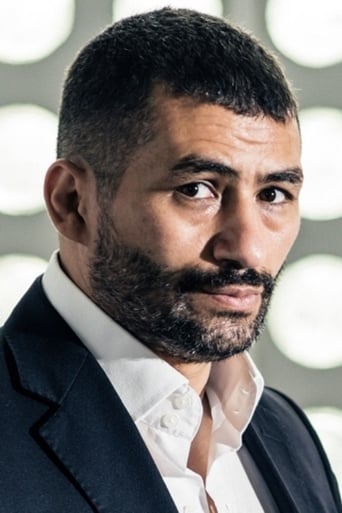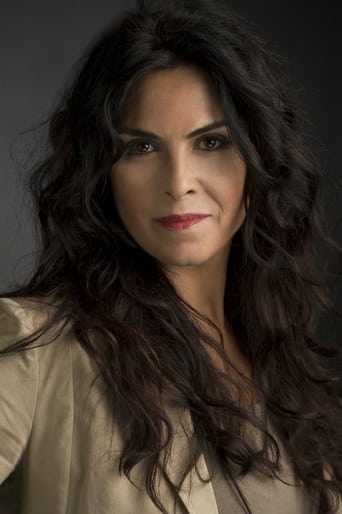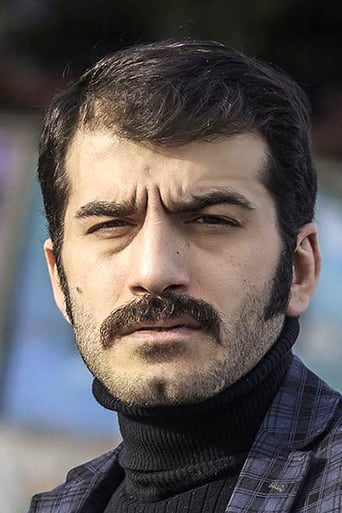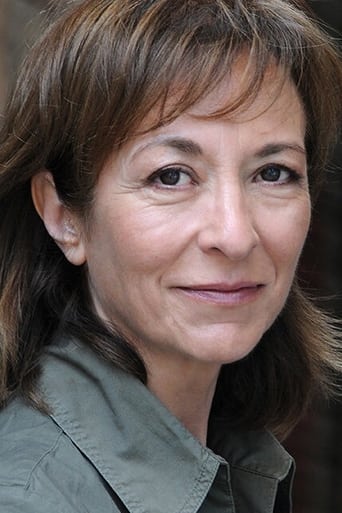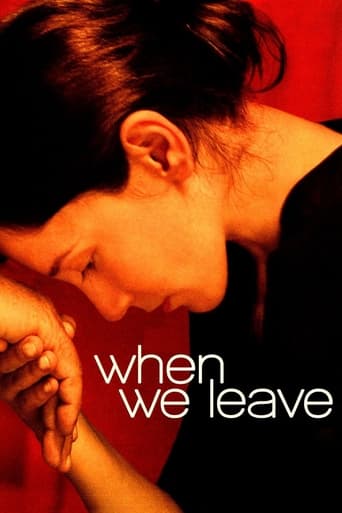
When We Leave
February. 28,2011Umay is a young woman of Turkish descent, fighting for an independent and self-determined life in Germany against the resistance of her family. Her struggle initiates a dynamic, which results in a life-threatening situation.
Similar titles
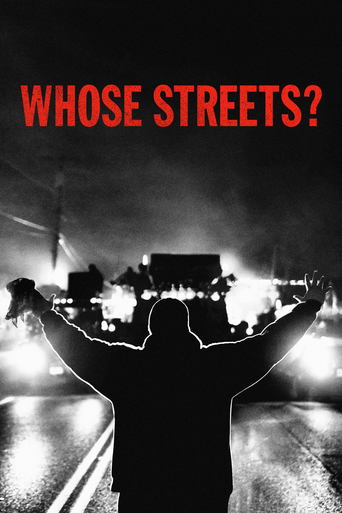

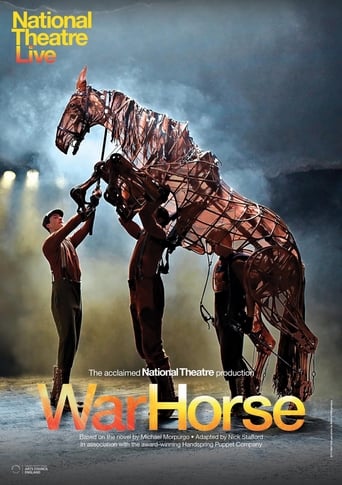

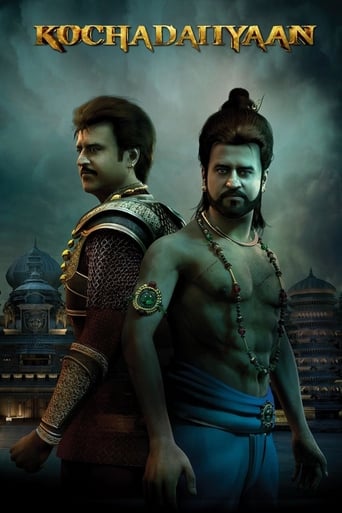
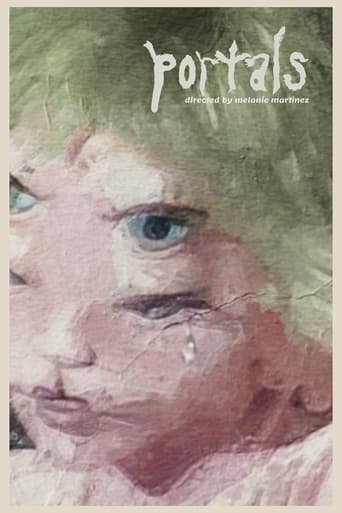
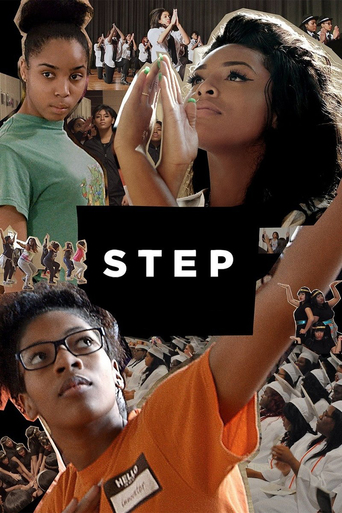
Reviews
the audience applauded
Expected more
Actress is magnificent and exudes a hypnotic screen presence in this affecting drama.
It is a whirlwind of delight --- attractive actors, stunning couture, spectacular sets and outrageous parties. It's a feast for the eyes. But what really makes this dramedy work is the acting.
This is a very strong film about honour killings. This has started to become more in the news in our Western democracies. In Canada we had the honour killings trial of the Shafia family."When We Leave" is an intense examination of the sordid events that lead up to an honour killing – in other words a pre-meditated murder. This woman decides to leave her abusive husband in Turkey to settle with her parents' family in Germany with her small son. Her father does not accept this situation and eventuality due to her whole family rejecting her she decides to set off on her own with her son. Eventually her family members track her down with the inevitable sad result. It is an excruciating story and very well acted particularly be the father. It is very grim and on several occasions this woman attempts to reunite with her family – but is rejected. I am sure this movie depicts much of the truth. Watch this, but be prepared, don't expect to be uplifted.
After seeing this film, I assumed it was directed by a Turkish director named Feo Aladag. When I googled this name, a picture of a young blond woman filled the screen. As it turned out, Feo Aladag is an Austrian actress/director, married to Turkish/German author Zuli Aladag, who is also the producer of Die Fremde. I mention this because I think it is important. In this film, the Turkish community in Germany is not pictured in a very favourable way. The story shows the fate of Umay, a young Turkish/German woman who wants a divorce because her husband beats her and because, perhaps more importantly, she doesn't love him. She leaves her husband and moves with her young son to her family in Berlin. Surprisingly, her father and brother take sides with her husband and urge her to return to him. In their view, she has dishonoured her husband and her own family by separating her son from his father. This conflict escalates in a dramatic way, with terrible consequences. The film pictures Umay as a woman who is denied her 'Western' rights as a woman and a mother, and shows her family as driven by 'non-Western' values like honour and tradition. For them, the community is superior over the individual. For her, it's the other way round. The message is pessimistic. Umay is a Turkish woman who adopts the German lifestyle. She wants to live her own life. She follows the integration model that the Turkish people in Western Europe are supposed to follow. But her brother and sister don't support her, although they are born and raised in Germany. They speak the German language, but think the Turkish way. Like some of the films of Faith Akin (in which lead actress Sibel Kekilli also starred) this film focuses on the problems of the Turkish community in Germany. But it has a darker and more pessimistic tone. It's a very powerful movie, dealing with a very urgent issue.
I have seen that the previous reviews on the movie also focused on describing the male-dominant concept existing in very Turkish culture. I will choose not to proceed with that part primarily, but only will share my impressions on the movie itself.However, I should still note that these fictitious series of events filmed are not unfortunately far away from the many, that are actual and real life stories. Positive Impressions: Sibel Kekilli appears to have pulled off a very good job with acting. Her role shares many things in common with the one she had in Head On- Gegen die Wand-Duvara Karsi. Her acting was obviously one of the major factors that would significantly influence the overall score, she definitely did a good job.The script itself is generally very realistic, mostly good at simulating a similar incidence that could have happened. It has errors to a certain level from where I look, which I will share later on. Dynamics of this family, with their sensitivity to gossips within their society and the type of expressions they use to deal with things etc. is projected quite accurately. There is a problem with technical depiction of the family, that I will point later on.Negative Impressions:The family itself, as it has been accurately pointed in one of the other reviews, does not support their suggested background. This corrupted social understanding is righteously attributed in one other reviews "to have become a method even independent from Muslim culture itself". Different backgrounds carry different amounts of this understanding. One family would have minded just a little bit, whereas the second would condemn their daughter at any chance, and a third would decide to "eliminate the problem". The third type of family is usually, if actually not always, belong to a very rural background. This third type of family, pictured in the photo didn't reflect such a background with the way they look or the way they talk. Umay's husband, even an accurate choice with his looks, sounded way too urban in the first minutes of the movie. Umay's mother, while with a rural way of talking in the first half, gradually transformed to a typical Istanbul lady with her pronounciation. The older brother was the best among others, whereas he alone couldn't suffice to keep the picture intact with the suggested background of the family. I believe a family image with sharper edges would have kept the picture more appropriate within the borders of realism.I would like to underline once more that the suggested background exists and is projected just to-the-point with choice of expressions family members use -whereas members themselves technically failed to give the impression of a "third-type family". As pointed once more in another review, you can never expect Turkish men to stop looking ahead and start watching their children while they are praying. While doesn't seem like a big issue for the whole movie, it essentially degrades the charm of the movie on viewers who are familiar with the culture. I have also been thinking several things about the plot, without coming to a final conclusion about what could have been better.* It's kind of complicated with why Umay goes to the sister's wedding... She promised her sister about it but she also recently moved away when her brother found out about where she lives. I'm not perfectly sure with the accuracy of realism here. However, it seems quite possible for a young lady who is so suppressed under clash of cultures to act emotional, as her conscious gets (unfortunately) less and less comfortable about the way she treated her family. * Also, the younger brother slapping Umay in the wedding, who has also been motivated to shoot her has been closer to "making sense" side of the shore during first half of the movie. He actually didn't seem to be really vulnerable to possible manipulations in the house, as he was apparently integrated deeper to the culture of the country. However, he was young and he was also under high supression, which can somehow justify his vulnerability. * I am also not very satisfied with the ending sequence. An older brother waiting with a knife in the corner for the younger brother to shoot the sister with a gun, then taking the job over when the younger fails. It's quite suspicious why he didn't pull the child off before going for some stabbing. I would picture an evening scene in some silent corner of the city, where the kid would be taken away by younger brother to somewhere else and Umay would have been killed by the older one. Finally, I am not perfectly sure if a complete outsider to the whole thing would get the concept and dynamics of the social structures in the movie. The movie itself did quite a good job with it, it's only about imagining reaction of a perfect strange to the culture and this content. I naturally cannot be objective, since I already have knowledge about the whole thing. Even I have noted many negative impressions, at the end of the day (with a Turkish way of saying something), this movie is generally very real. The chain of events, apart from the technical depiction of the family, definitely make sense, since there are unfortunately similar real life incidents continuing to happen every year. It is a good feeling to see an above-the-average attempt on screen for giving a chance to every individual, to leave anything else than their sole humanity outside the theatre and watch -and think.
Austrian actress Feo Aladag's directorial debut touches upon the concept of "namus" which has been treated many times before. Namus,which is roughly translated as "honor" is a female-bound ethical category in patriarchal societies. It is ostensibly a part of the traditionalist Muslim societies but the concept "namus" actually predates Islam and the Judeo-Christian religion. Regarded as the perfect form of female appropriateness today,namus in time lost its connection with religion and became an expression of hidebound traditionality.What makes this concept a popular subject for the cinema makers is the fact that the very concept does not set any rules for men in uber-conservative societies.In such a society males are supposed to control the women in their families. The fact that men are unaccountable for their actions while women should act perfectly along the line of appropriateness shows that "namus" came to be social mores that has not much to do with religion. In the movie Sibelli Kekilli plays a battered housewife who has been continuously abused by her husband. When she can't take it anymore she decides to go back to her family in Germany. Her family gives her a chilly welcome when they realize she is planning to leave her husband. Presumably from a generation of Gastarbeiter, the family is utterly conservative and a daughter's coming back to family with her kid and ending her marriage is unthinkable for them no matter how violent her husband would be. No matter how many times it has been treated before, the subject is a humanitarian one.It is not difficult to denounce the tartuffery of pious morality but you need to get credits for that. Die Fremde does not exactly offer a thought-provoking portrait of a damsel in distress.It feels like shouting at your face and telling you "I have thought of everything for you." Umay pursues an effectively independent way for herself and her son. She leaves her husband, she even leaves her family when she realizes that they will take her son from her. What does she do then? In spite of the warnings of foster home authorities, she continues to see her family. Though she gets physically attacked by her brother, she goes to her sister's wedding. Is that the way a girl who wants be independent should act? Why should a girl who has found a -sweet,caring boyfriend who wants be a father for her kid- be a pathetic person? Feo Aladag criticizes the stubbornly prejudiced, narrow-minded and inflexible mores of this society but she just indulges in incoherences. When Umay's mother Halime (Derya Alabora) hears that her other daughter Rana (Almila Bagriacik) is pregnant from her boyfriend all she says is "We're ruined." and the father just sighs when her wife says "they must get married". In a family like the one in the movie, Rana is supposed to be killed because of having blemished family's honor. What does the father do? The father chooses to pay the boy's father to get a definite marriage.Instead the family decides to kill the other daughter who can legally get a divorce.Let alone the fact the the characters do not act like a Turk (when the conversation turns into Turkish the characters do not sound as natural as they sound in Turkish.No Turkish-Muslim watches his son's imitative praying instead of following the imam during the salat in the mosque)they do not really give the reactions you expect from a traditionalist family. Sibel Kekilli's acting is superb but the story remains unconvincing,slipping too easily into melodrama and a series of incoherent scenes.
Top Streaming Movies











